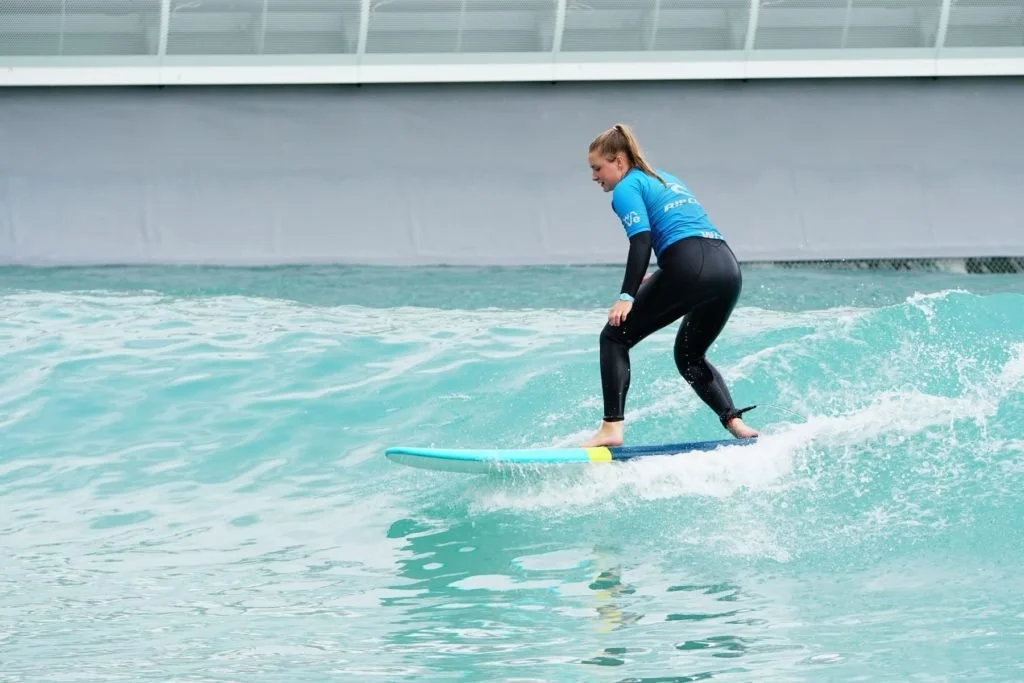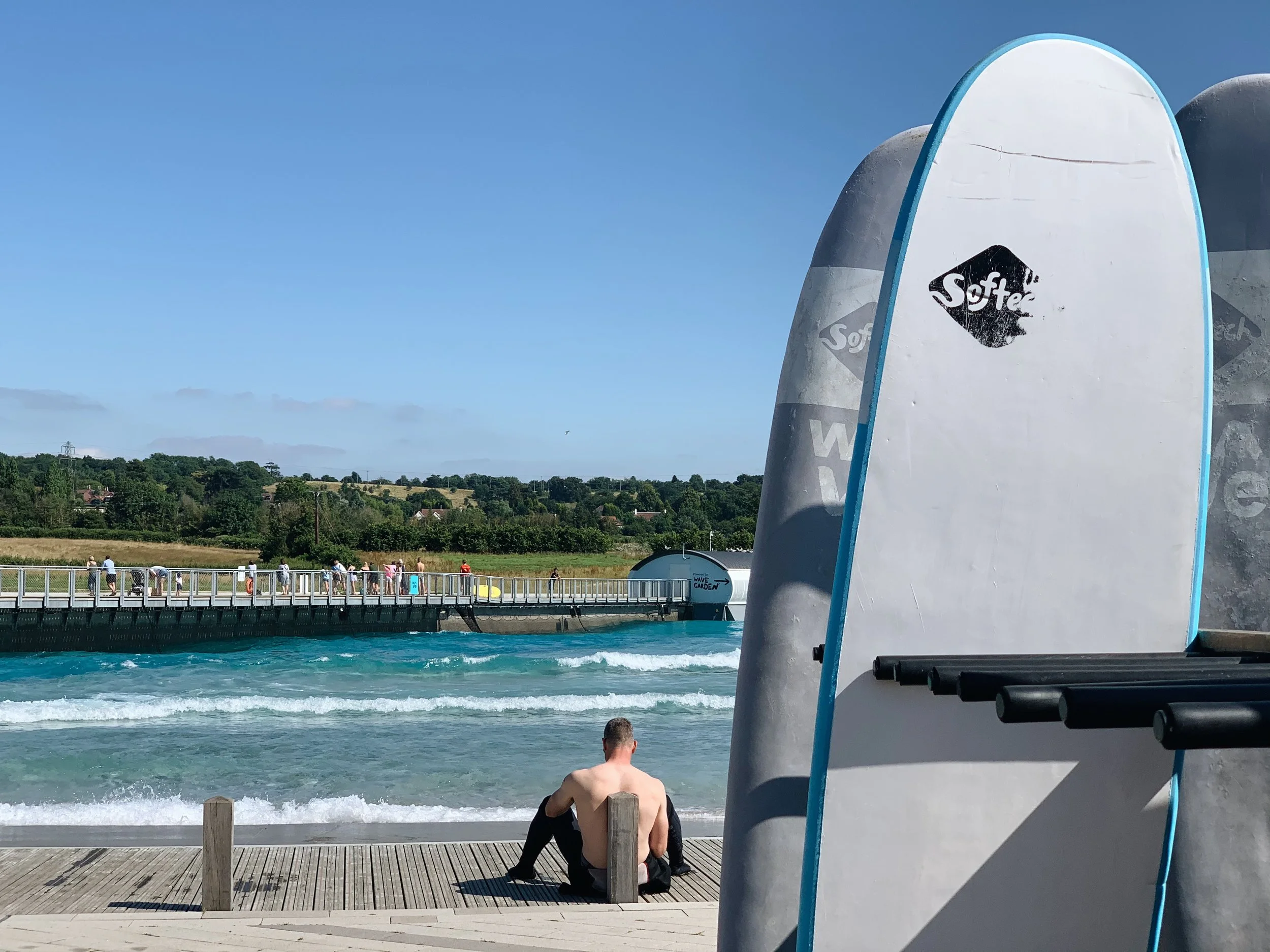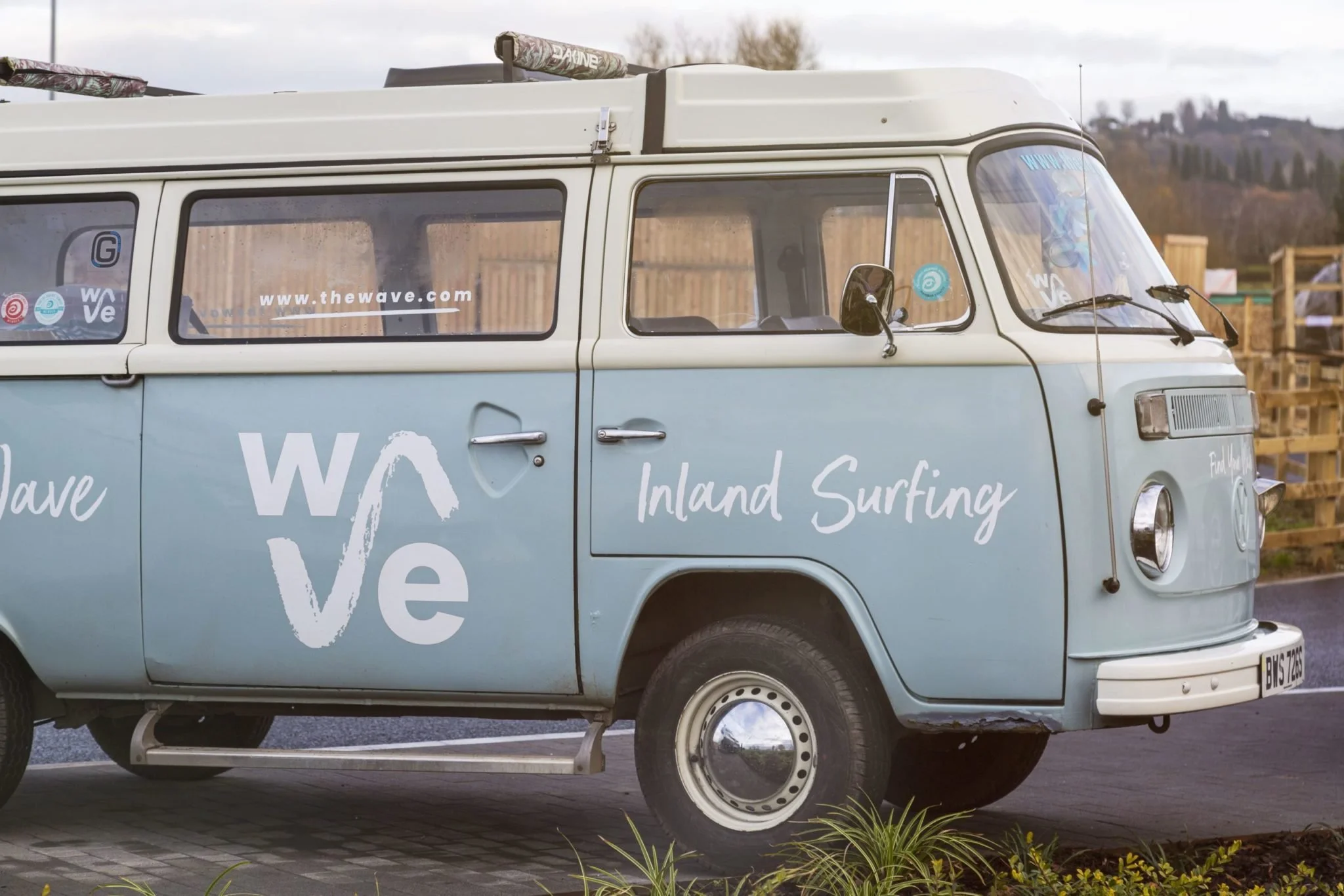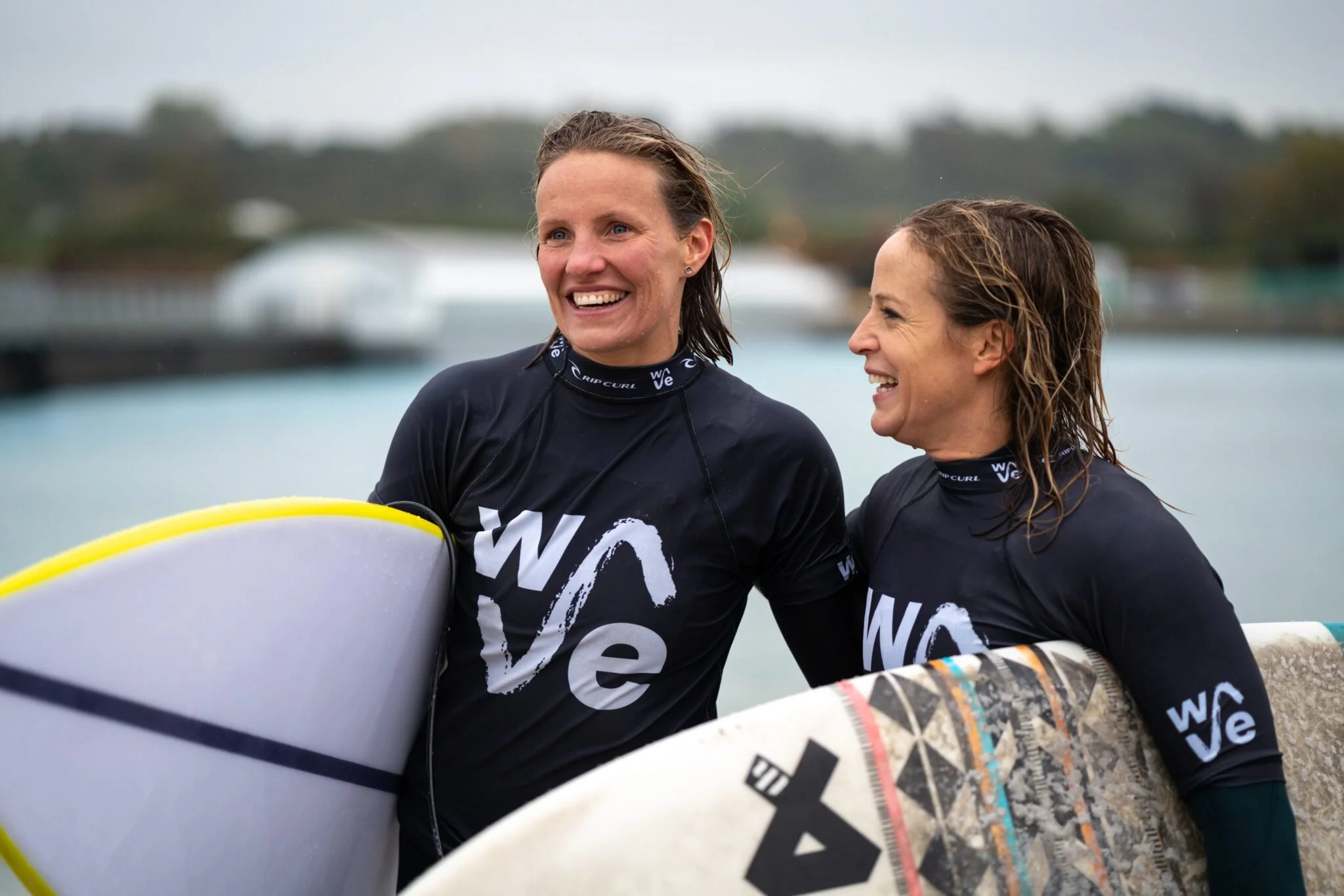If Lost Start Here is a guide for the anxious, curious, lonely and lost. Featuring everyday places and at-home prompts designed to help you live a life that feels good.
The Wave
In Conversation with Founder Nick Hounsfield
With The Wave, Nick Hounsfield has created a slice of California on the outskirts of Bristol, but this is no ordinary surfing destination. Beyond the blue waters, burrito trucks, and clubhouse, Nick and his team are rethinking issues of social health, mental well-being, and our mind-body connection.
Let’s start with your own story. Where did the idea for The Wave come from?
I had been an osteopath for many years – my dad was also an osteopath – and I grew up in a relatively alternative health environment. I was always looking for a more natural way to heal the body and mind. I also had a huge love and respect for the outdoors and being in nature. I was always fishing, surfing, and sailing. Nature was a safe space for me, it’s where I went (and still go) when anything is going wrong in life. Even as a little kid, I always felt most comfortable there.
In 2010, my dad died tragically. I made a promise to him to do something big and bold that would take the things both of us treasured – helping people with their health and well-being and fusing that with all the things that we loved about life. I didn’t know at that time what that bold vision would be, but I knew I’d made at least a promise to look for it.
Over time I started to think about some of the things that were going wrong in society as I saw it. It was a time of city riots in Bristol, and I was noticing that a lot of my elderly patients were not going out because they were reading the wrong newspapers and thinking there was somebody with a hoody ready to mug them. They weren’t using the parklands and they weren’t going for walks, and they were physically and mentally suffering because of that.
I also could see a real rift in society in terms of not connecting with each other. I was lucky enough to go to Greece on holiday and I noticed sitting by a harbourside how the different generations came together. People of all ages and backgrounds were together in one hub. We don’t have the climate for that in the UK, but I started to wonder whether we’ve got those spaces properly thought through anyway.
And then because I’ve been a surfer all my life, I started to think about creating a space around that, a blank canvas: what would a really engaging space look like that would bring people together? It’s focused on water, and has a nice building, a great landscape, and amazing food…
One day on YouTube an announcement flashed up about this new technology that could make perfect surfing waves in a lake. It was all the things I’d been thinking about for six months as I tried to get my head around what that space could look like. I thought if I could take a slice of the ocean and create perfect surfing waves, we could use that as the hook to have people come and explore, get into the landscape, and then deliver a whole lot of messaging around that as well in terms of trying to bring people together who for different reasons aren’t mixing very well.
We could make sure that people have access to good food, good spaces to just feel like they can live and breathe, and hopefully create a place that people can come and be excited, or even just reflect, and be in a space not a million miles away from their home. We could also grow a community of people who want to use that space in a way that maybe they haven’t had access to for a long time.
What did it take for you to make that vision a reality from the moment of realizing what that is to you to sitting right now in what you’ve created?
I think it’s a very, very clear purpose of why I wanted it to be done. You just need something that’s a complete driving force and will get you through the ups and downs of getting a project like this going.
It was important that it was a promise to my dad, and I shouldn’t discount that as being a big part of it, because that became an incredibly powerful thing: a promise to somebody that you cherish in life can get you over some massive hurdles.
I think on top of that though it felt like such a compelling vision in terms of that purpose for why we wanted to do it, that it just had to happen. Why wouldn’t you want to do that?
As I spoke to more and more people about it, they started to encourage me. It was something that lots of people wanted to see and experience. Maybe it’s bowing to peer pressure.
And then a massive amount of naivety. It started off small and just grew steadily over time: a small plot of land but then if you’re going to do it you might as well do it properly. Everything grew and grew and grew.
I was also inspired by people who have done crazy things before. I got in contact right at the beginning with Sir Tim Smith who built the Eden Project, so again a bonkers idea to take a big ole wasteland of a clay pit and putting in one of the most iconic buildings possibly in the world. I managed to get his number and called him up one lunchtime between treating patients and told him what I wanted to do, and he totally encouraged me. In his words, it was one of the craziest things he had ever heard, and he thought that I should absolutely do it.
Creating The Wave must have been life-transforming for you. You went from being an osteopath which is a very singular profession to over the past ten years making happen this whole ecosystem that brings in so many different people and components. When you look at what you’ve achieved, how has this impacted your life on a personal level, and how has making your dream real shifted your perspective?
In my role as an osteopath, I would go to the same place every day and have very similar interactions, but I also had to make a connection to completely different individuals maybe 16 times a day and try to work out what’s the interface where I can help this person for this time that I have with them.
Even then it was all around trying to be as holistic as possible, really to get under the skin of why these people were coming with problems to me.
What I do now is more of that but within much bigger thinking: I can now understand what the common themes are with people and how I can impact a bigger section of society and try to help. It’s a much broader base of people coming with the same issues.
But then having seen what’s able to be done and achieved this vision, it makes me go maybe that vision was a bit small, which is crazy because back then I would have just pinched myself, but now we’ve proved we can do this, we’re now thinking let’s do it again and let’s go bigger. There’s an opportunity to really scale up the impact we’re having on people’s health and well-being and be a real force for good as a business and community and brand, so why not?
That’s now a mindset that I’m constantly wrestling with. I’ve constantly got bigger thoughts and I’m trying to temper that with a team around me who is good at slightly reining it in. My official role now is CVO, Chief Visionary Officer; I’m looking at what the 10-year plan, the 15-year plan, and even the 50-year plan are for The Wave. Asking what the legacy we should look at achieving now and how can we lay such a solid foundation as a business so that we can be clear in the decades to come that we will be able to keep repeating this model in different sites.
Also thinking about longevity: I’m now looking out at 16,000 trees that we planted, and I’ll never sit under those trees in their shade. But how cool is it that we’re putting stuff out there that will be there for generations to come?
If we’re thinking about impact, the two things that struck me, there’s the impact on physical space (and across generations), and there’s also the impact on people’s well-being. You clearly situate The Wave within that mental health piece. Through your space, you’re also making sure people are happy in their minds and their bodies. How are you approaching that?
If I take it back to basics with myself, I just knew that when I go surfing and get in the water, I feel better. I absolutely knew that being around water – could be a cool-looking puddle or a vast ocean – there was something in that that made me feel relaxed/happy/excited, all those things. The more people I talked to, the more I found people who felt the same (except maybe some people who were fearful of water).
But there’s a lack of those spaces available to people – maybe they live in High Rise flats or inner-city dwellings – or they’ve never even experienced that connection to nature, what it’s like to feel calm or excited either being in or around water and how it can lift their mental well-being But it’s also about being active in that space and creating a bit of physical well-being as well.
In my perspective with The Wave, we’ve been able to create a space that can deal with all of that in terms of the sensory elements: looking at waves or hearing waves, the blue of the water. I knew even if people just come here and have a cup of coffee, walk around, and go back again that would be a positive input into their bodies and into their minds. Obviously, if you then supercharge that and get into the water, get all the energy from that, afterward, there’s that lovely feeling like you’ve achieved something. It’s good for your personality and confidence, but you’ve also tired yourself out, you’ve worked your muscles and benefited from having exercised.
There’s good food and happy people all around, a place that’s really helping you with your mind, a place that’s making you exercise that’s good for your body, you’re getting a better connection in nature as well: all those things allow people who come to visit just feel much more positive on all those accounts.
Over the pandemic, there has been a shift in conversations around mental well-being. What part has this played in the evolution of The Wave? You’ve had the past two years that have really shown people why what you do matters so much.
100%. It’s been the worst time for us to start this project because obviously, we had to go right the way through the pandemic, and from a business point of view that’s not been great. But we’re now able to push on an open door. It’s just of the time, it’s the zeitgeist, people are talking about their mental health more, and it’s just brilliant to hear people talk about the connection to nature. Having been shut down and stuck in our houses, restricted to just one hour getting outside, and suddenly that one hour became the golden hour, the time we could go out and do something, it’s really opened that conversation very genuinely. Still, now you’ve only got to pick up some paper and there’s something about mental health, how it’s important, the connection to nature, and why we need to be protecting it. Society has shifted to what the team and I thought was originally important with The Wave.
Now The Wave is here, what’s next for you? What does the immediate future look like?
There are two parts: I had a stroke two years ago that was in many ways another part of the journey and a rollercoaster. I had six weeks of starting to recover when I had my own lockdown before the rest of society got to experience one as well. I already had a bit of an idea for some of the things, when hopefully I could come back to work, that we needed to focus on. I had a renewed perspective about the things that I knew mattered to me and that I wanted to share with other people.
We’ve always had a very clear mandate that this is going to be for all ages, all backgrounds, and all abilities. We’ve got to make money post-pandemic, but we’ve always had that purpose. I felt like with all ages we were doing quite well. With all abilities, this whole place has been set up for people with disabilities, like wheelchair access. I’ve been working for eight years now with the adaptive surf community, so I knew this place physically had been created in the right way.
But with that alls background aspect, such as the lack of ethnicity within surfing, we needed to look at that too. We need people to have access from much broader, much more diverse communities.
Coming back from my stroke, we started a social impact group. Now the ambition this year is to have 5000-6000 people, mainly kids, come here who would never have had access: school groups, kids with various disabilities, and people from underprivileged backgrounds. We’re also working to change the diversity of the people who work here, so if we can get more people from more diverse cultures working here then hopefully that will start to reflect on the people using the space and who feel comfortable here.
Also, we’ve just done this deal so that can open another six spaces in the next five years and we’re looking at places where we can put another Wave that’s absolutely in the sweet spot in terms of commercially making sure that people that come here can pay good money to use it and that’s also based around an incredibly diverse population and real social and health issues such as obesity, drinking, drugs, who would benefit from access to it too.
We’re opening a Wave in London. We want to take our learnings from here in Bristol and then transpose that into a place that’s on people’s doorstep but where we can create that bigger vision of going right back to the basics of wanting to impact people’s health and well-being across the entire spectrum of society.
Once we’ve done that there, I think we’ve got the perfect blueprint where we can do something that’s close to an urban setting, or another smack down in the middle of a massive metropolis. We can go, who wants us? We’ve got this model where we can help local authorities with their own social impact objectives, help them with some of their issues around getting communities together, self-prescribing, and having people look after their own health, rather than relying heavily on the NHS system. We can become not all things to everyone but be able to have a positive impact on people’s health and well-being across the UK. Then ideally, we can then go abroad to other countries with other big conurbations which have the same social issues and are trying to help their own populations locally with some of the struggles that they have but also want something attractive that can become like a lighthouse for them. To me, that’s exciting.
Is there anywhere else like you?
We’re just something very different. I think we need to create a new category for what we’re doing: The core purpose goes back to a health and well-being destination, but it fits within this new experience, which is the surf park industry. If we’re going to do more of these and they are going to be called The Wave, what I would love is for someone to pick up what we’re doing and say I want to build a surf park or destination, but one driven by that health and well-being agenda. That’s my main motivator whereas everyone else is coming at it from that other side, going let’s build a surf park – it’s going to be cool, and we should probably do something good for people. And it’s a bolt-on, rather than core. Or a big real estate play.
What we really want to do, and we’re one of the first out the door, is really set the benchmark: if you want to build one of these places absolutely make sure you are looking after people and the planet in the same vein as looking after your profit. If we can then show that it is a successful model to deliver, and it’s a future-facing, then I think we have a real shot at creating something new and exciting for the world which also has that sustainability built in from the start rather than something which is a get rich quick venture which is never what it was about.
What can someone do wherever they are to connect with your work at The Wave?
I’d say in terms of the much bigger picture, working with local people already in this space. Like making sure we have an amazing coastline all around the world and getting involved in social impact issues like the environmental side and marine protection. If you believe in us and the power of what we want to do, there are other people out there who have that same connection with nature.
Creating this artificial landscape based around surfing creates an incredible ability to get that messaging right. We’re already working with Surfers Against Sewage, and Surfrider Foundation. Over the next couple of years, you’ll see more of this network growing around us and us growing around the network. So, seeking out like-minded souls working in this field.
The main thing now is also following the journey of The Wave and seeing what touchpoints really spark people’s enthusiasm. We’re always happy to suggest where people can get involved, and hopefully, The Wave can come to a place near you in the future.
Where do you go when you are lost, lonely, anxious, or curious?
I go to the water. I equally get just as happy in the mountains but there are not so many mountains around here. 100% of what we’ve created here is what I’d go to myself which is the whole impetus behind it. When I had my stroke when I was able to get into the water, no word of a lie, I felt like I was myself again. Every single time I got into the water, I felt better and better and better, much more so than anything else I’d done to that date. Within about three months I managed to get into the water and almost within an hour of being in the water, suddenly I was back.






